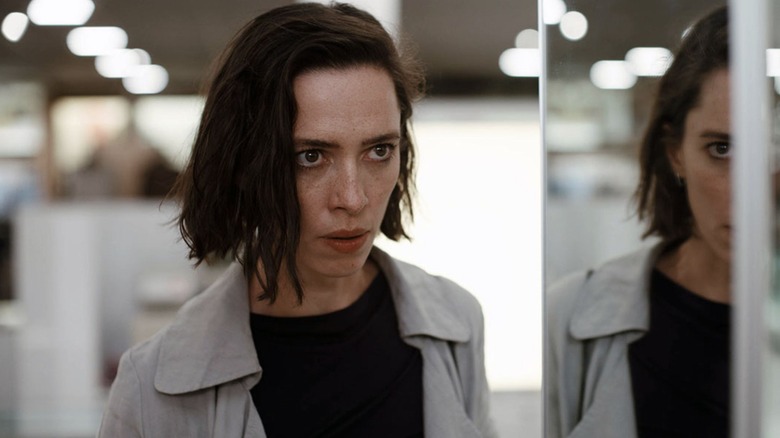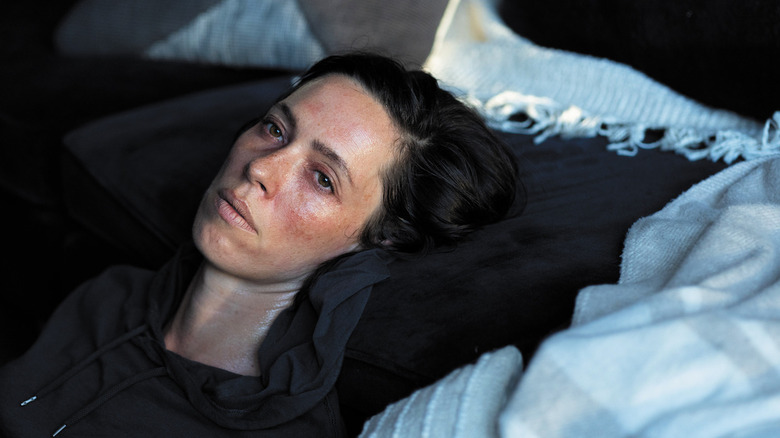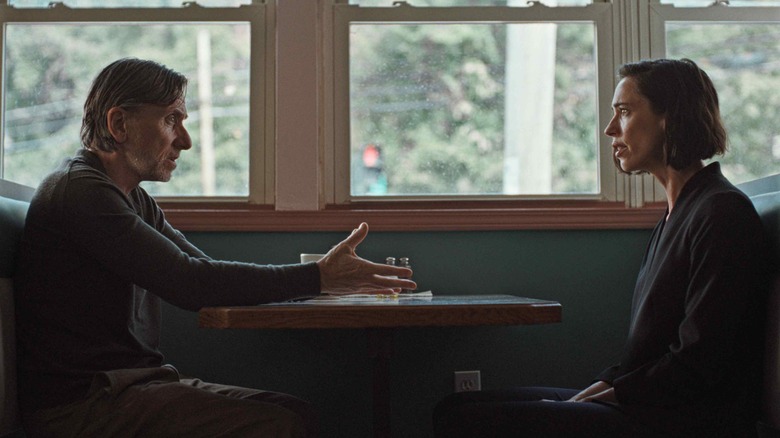Resurrection Star Rebecca Hall On Performing A Monologue In A Stunning Eight-Minute Long Take [Interview]
Rebecca Hall is in every scene of "Resurrection." Andrew Semans' film revolves around Margaret, played by Hall, whose past haunts her. The less said about her experience before and during the course of the movie, the better, but in one scene, Margaret lays bare her trauma in a take that lasts around eight minutes long in which Hall commands the frame. Semans doesn't give the audience a break from the character recalling her harrowing experience, and nor should he.
There's no reaction shot to another actor. As her co-star Tim Roth told us, pulling off that shot is no small feat for an actor. It's a lot of exposition, drama, and storytelling packed into one scene. With spoke with Hall about her experience shooting that scene, working with Roth, and how her evolution as a filmmaker has affected her as a performer.
'When it comes to action, rolling, I don't really know what I'm going to do most of the time'
There's a great long take in the movie that lasts around eight minutes. A close-up of you. How do you prepare for that shot? What can't you prepare for?
I learned the lines very well and I knew there would only be a couple of takes. We didn't have much time. I was prepared for all of that. What can you not prepare for? I suppose the fact that the room that we were shooting in had a very noisy air conditioning system and we didn't have jurisdiction to turn it off [laughs]. I was delivering this very quiet internal monologue and I'm like, "Do I have to speak louder because of the AC unit?"
[Laughs] Well, it's very emotional, especially the stillness.
I don't make those choices.
Oh, no?
No. I don't mean that someone else does. I just mean I'm not really in control of them. I don't know. I think I rely an awful lot on instinct. I think a lot about the logic of a character and I think a lot about how credible the journey is from A to Z. Not credible in other senses but like ... how do I buy it? Do I buy that this character is feeling this from each beat to each beat? I think about that an awful lot and I learn the words. But when it comes to action, rolling, I don't really know what I'm going to do most of the time. I do rely on my instinct to just sort of see what happens, and it came out that way. I don't know how to tell you why, but it just felt right.
That's something I was wondering even watching it, the balance between meticulous planning and just instinct.
I really believe that you can't throw everything out the window and rely on your instincts unless you've planned. I don't think you can plan — plan as in, "I'm going to say a line like this with this intonation that's going to sound exactly like this, and I'm going to make my face do this." [laughs] You can't do that. That's dumb and doesn't make any sense. What you can do is plan like, "What am I feeling in this scene? What do I want? Why am I doing this?" You can think about all those things and you can also imagine ... in this instance in the monologue, I'm imagining memories, so I craft the memories in my head and then I cycle through them as I'm saying it. I just experience it as hopefully a person would. I mean, I sound so bloody obvious, but...
You don't, because some actors say, "Really understand your face, know what you're going to do." I guess everyone has their own thing.
Everyone has their own thing.
So what was your reaction when you saw how that scene ended up?
I don't know, actually. I don't know if I had any kind of reaction. I think I was just like, "Oh yeah, got through that. Well done. Said all the words in the right place. Okay. Good. Well done."
'How do you justify suddenly sitting into seven minutes of chat?'
Andrew said his directions were very simple for you and Tim. What's an example of a simple piece of direction?
He would explain to me what the camera's doing so I didn't accidentally deliver my performance to the wall or something [laughs]. It's that kind of thing. Or he'd explain, "We're probably going to play it in this shot, so this will be for this piece," or whatever it is. It's very technical, but I like that because then I have a rough understanding of how he's aiming to cut it together. I know where to give him the beats that are going to be specifically useful.
Obviously, he had the ultimate understanding of Margaret because he created her. But you definitely get to a place as an actor where you slightly internalize the character and feel like you know her better than the person who wrote it. I say this as someone who writes material for actors, too, and I hope that they get to that point where they are like, "[I] know more about this than [you] do."
There is a shorthand that happens because it's like, "Does this feel like a Margaret kind of thing?" We could both be like, "Well, obviously we know what she's doing here because she's in one of those 'maintain control' places or she's in one of those, 'the edifice is crumbling and all of her vulnerabilities are coming through' places."
We spoke a lot about how her suppressed rage and anxiety and inability to actually deal with her past in a therapeutic way sometimes leads to her own abuses of power, which I always thought was an interesting conversation and one that I really cherished, because it was helpful. Especially when it comes to the monologue, actually, because it's very expositional and you're confronted with a bit of a problem as an actor. It's like, "How do you justify suddenly sitting into seven minutes of chat?"
Andrew had brilliantly crafted this relationship with this intern who is Margaret's employee. She's young, she's vulnerable. Margaret, I want to say gets off on giving her advice, but it's the wrong phrase. She feels calmer that she's in control of somebody else, a little bit. "Make sure you do this and make sure you do that," but it's borderline overstepping.
You get to this scene, and, of course, she's going to suddenly launch into this story to this person, because she can. Because this person has no bearing on her life. She works for her. She can tell her to shut up or that it's a lie, and it all comes pouring out. It's abusive to dump all that on someone.
It's telling when she asks, "Did I help?" She doesn't ask, "Are you doing better?"
Like, "Am I good?" Yeah, exactly. It's a little bit narcissistic. She's a lioness and the trauma has bred ... she's broken in that sense.
Now that you've directed and continue to write, how has that changed how you act?
I'm sure it must have changed it for me. I don't really see how, because acting on a film set, you're in such close proximity to a director. You can choose to be the actor that's sort of oblivious to what's going on and just concentrates on their specific part, but I'm not. I've never been that kind of actor. I've always been the actor that's looking at what's going on and how the whole thing is pulling together, and what's required of me to help with the overall project. Most actors do that as well, by the way. It informed my directing more than directing informed my acting, I think.
"Resurrection" opens in theaters July 29 and hits On Demand on August 5, 2022.


